Mounting losses show limits of Donald Trump’s power

Donald Trump opened May by lifting a trailing Senate candidate in Ohio to the Republican nomination, seemingly cementing the former president’s kingmaker status before another possible White House run. He’s ending the month, however, stinging from a string of defeats that suggests a diminishing stature. Trump faced a series of setbacks in Tuesday’s primary elections as voters rejected his efforts to unseat two top targets for retribution: Georgia’s Republican governor and secretary of state, both of whom had rebuffed Trump’s extraordinary pressure to overturn the results of the 2020 presidential election. But the magnitude of defeat in the governor’s race — more than 50 percentage points — was especially stunning and raised questions about whether Republican voters are beginning to move on from Trump. Nearly six years after the one-time reality television star launched what seemed to be an improbable campaign for the White House, the “Make America Great Again” movement Trump helmed isn’t going anywhere. But voters are increasingly vocal in saying that the party’s future is about more than Trump. “I like Trump a lot, but Trump is in the past,” said David Butler of Woodstock, Georgia, who voted for Gov. Brian Kemp on Tuesday and said Trump’s endorsements had “no” impact “whatsoever” on his thinking. It was the same for Will Parbhoo, a 22-year-old dental assistant who also voted for Kemp. “I’m not really a Trumper,” he said after voting. “I didn’t like him to begin with. With all the election stuff, I was like, ‘Dude, move on.’” One thing Parbhoo liked about the current governor? “Kemp is focused on Georgia,” he said. Trump sought to play down the losses by his favored candidates, saying on his social media platform Wednesday that he had a “very big and successful evening of political Endorsements” and insisting some races “were not possible to win.” Still, the pattern of high-profile defeats is hard to ignore. After JD Vance vaulted from third to first place following Trump’s late-stage endorsement in the Ohio Senate primary, the dynamics took a turn. Trump’s pick in Nebraska’s primary for governor, Charles Herbster, lost his race after allegations surfaced that he had groped women. In Idaho a week later, the governor beat a Trump-backed challenger. In North Carolina, voters rebuffed Trump’s plea to give a scandal-plagued congressman a second chance. And in Pennsylvania, a marquee Senate primary featuring Trump-endorsed celebrity heart surgeon Mehmet Oz remains too close to call. But his biggest upset was in Georgia, a crucial swing state, where former Sen. David Perdue, whom Trump had lobbied to run and helped clear the field for, lost to Kemp. The governor was among Trump’s top targets after he refused to overturn the results of the 2020 White House election in his state. Georgia Secretary of State Brad Raffensperger, who defied Trump’s call to “find” the votes to change the outcome two years ago — a call that is now under investigation — also won his party’s nomination. Attorney General Chris Carr and Insurance Commissioner John King — all opposed by Trump — were also successful in their primaires. In Alabama, Rep. Mo Brooks, whose Senate endorsement Trump rescinded as he struggled to gain traction, made it to a runoff, having gained support after Trump dropped him. Trump has endorsed in nearly 200 races, from governor to county commissioner, often inserting himself into contests that aren’t particularly competitive and helping bolster his compilation of wins. Some of his work, even in races with multiple candidates, has paid off. His early support helped football great Herschel Walker and Rep. Ted Budd sail to their respective Senate primary nominations in Georgia and North Carolina. Sarah Huckabee Sanders, Trump’s former press secretary, easily won the GOP nomination for governor in Arkansas. And even in Georgia, all of the candidates Trump endorsed in open races won or will head to runoffs. Some allies say Trump’s endorsement tally is a poor measure of his influence, even if Trump constantly promotes that record. They argue that voters may support the former president and be eager for him to run again but may not be persuaded by his selections, especially in races with governors such as Kemp, who have long histories with voters. And even without Trump on the ballot, the party has been transformed in Trump’s image, with candidates adopting his “America First” platform, mimicking his tactics, and parroting his lies about a stolen election. But with Trump out of office and relegated to posting on his own social media platform, other voices are beginning to fill the void. Fox News host Tucker Carlson, the most-watched personality on cable television, has become a driving ideological force in the party. Republicans such as the conspiracy-embracing Rep. Marjorie Taylor Greene, who won her party’s nomination for reelection Tuesday, have taken up his mantle in Washington. Meanwhile, potential presidential rivals to Trump are waiting in the wings for 2024. Former Vice President Mike Pence, who has been distancing himself from Trump, rallied with Kemp in suburban Atlanta on Monday evening and told the crowd that “elections are about the future” — an implicit knock on his former boss. Trump has also spawned a new generation of candidates who have channeled his “MAGA” brand but who have done so independent of his support and see themselves as its next iteration. “MAGA doesn’t belong to him,” Kathy Barnette, the Pennsylvania Senate candidate whose late-stage surge stunned party insiders, said in an interview. “Trump coined the word. He does not own it.” While the left, she said, may see the “MAGA movement” as a “cult of Trump voters,” she said it goes far beyond one man. She argued that Trump had succeeded in 2016 because he aligned himself with voters’ concerns and said out loud what people were already thinking, particularly on immigration. She said she tried in her race to do the same. “I do believe Trump has an important voice still,” she added, but “he needs to get better advisers, and in addition to that, he needs to do better himself in remembering why we aligned with him. And it wasn’t because we were aligning with his
Barry Moore joins lawsuit to end mask mandate for air travel

Representative Barry Moore has joined sixteen of his colleagues in a lawsuit against the Centers for Disease Control and Prevention (CDC). The lawsuit, Massie et al v. Centers for Disease Control and Prevention, seeks to end the CDC’s mask mandate for individuals traveling on commercial airlines. Reports indicate the Biden Administration is extending the CDC’s mask mandate until April 18. Massie et al. v. Centers for Disease Control and Prevention was filed in the United States District Court for the Western District of Kentucky. The named defendants are Centers for Disease Control and Prevention, Rochelle P. Walensky in her official capacity as Director of the CDC, and Sherri A. Berger in her official capacity as Chief of Staff of the CDC. The lawsuit contains two primary claims: First, none of the statutes or regulations cited by the CDC for the authority to mandate that individuals wear masks on commercial airlines, conveyances, and at transportation hubs, permit the CDC to implement or enforce this mandate. Second, even if Congress had granted the CDC the authority to promulgate the mask mandate, the granting of this authority would violate a principle known as the “non-delegation doctrine.” Moore and his co-plaintiffs are asking a federal court to declare that “the mask mandate is beyond the CDC’s statutory authority or is unconstitutional.” The plaintiffs are also seeking an injunction that prohibits the CDC, or anyone acting on the CDC’s behalf, from enforcing the mask mandate. Rep. Thomas Massie argued that the CDC doesn’t have the authority to force people to wear masks on airplanes because Congress never passed a law requiring it. “The Centers for Disease Control and Prevention does not have the legal authority to force people traveling on commercial airlines to wear masks,” stated Massie. “Congress never passed a law requiring masks on commercial flights. This lawsuit targets the faceless bureaucrats who are behind the CDC’s unscientific regulation so that this illegal mask mandate can be brought to a permanent end.” Moore argued that the mandate should end immediately because it infringes on constitutional freedoms. “Government bureaucrats desperate for relevancy are waging a war against everyday American citizens and their constitutional freedoms,” stated Rep. Moore. “The unscientific mask mandate for commercial air travel should be ended immediately, and I am proud to join my friend Rep. Massie in this lawsuit to end this charade permanently.” Additional plaintiffs for the lawsuit include Reps. Thomas Massie, Rand Paul, Andy Biggs, Dan Bishop, Lauren Boebert, Andrew Clyde, Warren Davidson, Bob Good, Paul Gosar, Marjorie Taylor Greene, Brian Mast, Alex Mooney, Ralph Norman, Bill Posey, Matt Rosendale, and Chip Roy.
Barry Moore joins lawmakers demanding hearing over treatment of January 6 defendants

Rep. Barry Moore, along with 20 colleagues, sent a letter to Chairman Jerry Nadler and Chairwoman Carolyn Maloney asking that House Judiciary and House Oversight & Reform Committees hold hearings on the treatment of January 6 defendants being held at the D.C. Department of Corrections. The letter states that the defendants are being held in solitary confinement and are not being given needed medical treatment. U.S. District Judge Royce C. Lamberth asked the Department of Justice to conduct a civil rights investigation into the conduct of the D.C. jail regarding a patient who needed treatment for non-Hodgkins. Lamberth stated, “It’s clear to me the civil rights of the defendant were violated by the D.C. Department of Corrections.” “Regardless of the charges an incarcerated person faces, correctional authorities should respect and uphold their civil rights and protect their health and safety. In this country, they have the presumption of innocence. They have not faced trial. And even convicted criminals should get adequate medical care and proper food. They are human beings. The reports coming out of the D.C. Department of Corrections are deeply concerning, and Congress should use our oversight authority to investigate,” said Rep. Moore. Moore stated on Twitter, “Regardless of the charges and incarcerated person faces, correctional authorities should respect and uphold their civil rights & protect their health & safety. In this country they have the presumption of innocence.” “There is clear mistreatment of the individuals being held in the D.C. jail for charges related to January 6th,” stated Biggs. “There is NO excuse for keeping them in these abhorrent conditions and continuing to impose solitary confinement – a punishment that even some on the Left have condemned. It’s time for Chairman Nadler and Chairwoman Maloney to set aside any political motivations, do their job, and hold hearings so that we can get to the bottom of this.” Reps. Marjorie Taylor Greene and Mary Miller expressed disapproval for Deputy Warden Kathleen Landerkin’s actions. Rep. Greene stated, “The atrocious and inhumane conditions for PRE-TRIAL detainees at the D.C. Gulag are a clear example of the two-tiered justice system in America. BLM / Antifa domestic terrorists are allowed to walk free after burning down our cities with violent riots, but suspected J6 defendants are subjected to worse treatment than convicted terrorists in Gitmo. This situation must be investigated, and the officials responsible must be terminated from their positions, starting with avowed Trump-hater Deputy Warden Kathleen Landerkin.” “Deputy Warden Landerkin is using her position to torture her political opponents in a system where justice is supposed to be blind,” stated Miller. “There is clear mistreatment of the individuals being held in the D.C. jail for charges related to January 6th,” stated Andy Biggs. “There is NO excuse for keeping them in these abhorrent conditions and continuing to impose solitary confinement – a punishment that even some on the Left have condemned. It’s time for Chairman Nadler and Chairwoman Maloney to set aside any political motivations, do their job, and hold hearings so that we can get to the bottom of this.” The letter was also signed by Scott Perry, Jeff Duncan, Lauren Boebert, Andy Biggs, Debbie Lesko, Andy Harris, Randy Weber, Bill Posey, Russ Fulcher, Matthew Rosendale, Sr., Louie Gohmert, Andrew Clyde, Mary Miller, Marjorie Taylor Greene, Jody Hice, Matt Gaetz, Bob Good, Michael Cloud, Ralph Norman, and Clay Higgins.
Death threats, tweets jolt GOP infrastructure supporters
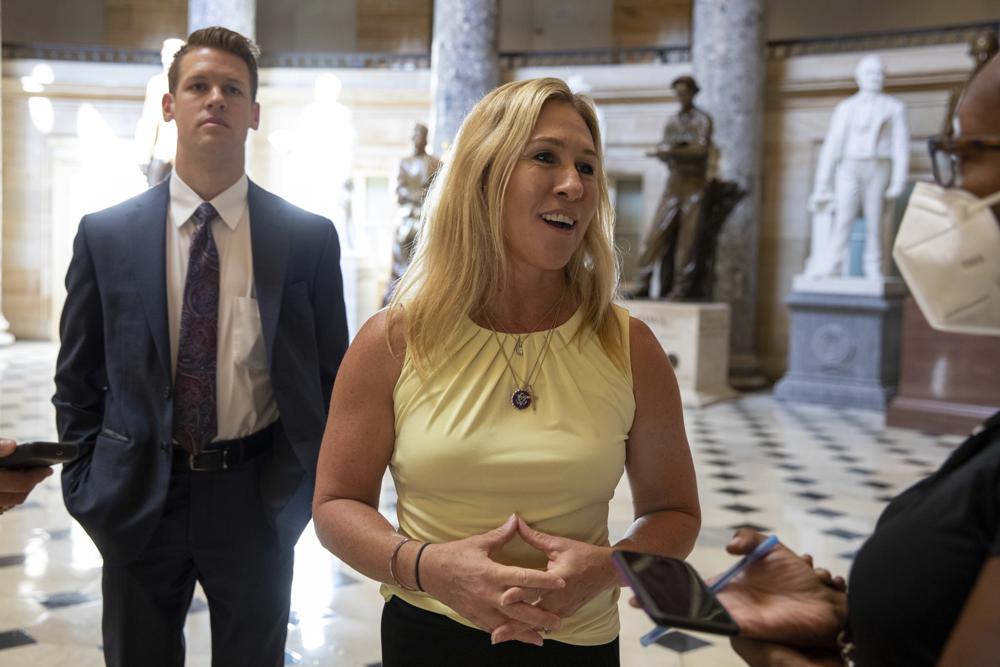
The last time Congress approved a major renewal of federal highway and other transportation programs, the votes were 359-65 in the House and 83-16 in the Senate. It was backed by nearly every Democrat and robust majorities of Republicans. This year’s $1 trillion infrastructure bill easily cleared the Senate 69-13 with GOP support but crawled through the House last week by 228-206 with just 13 Republican votes. Those defectors were savaged afterward by former President Donald Trump, hard-right Rep. Marjorie Taylor Greene, R-Ga., called them “traitors” while tweeting their names and office telephone numbers, and one of the 13 says he received a death threat. The votes, six years apart, and the harsh blowback against Republican mavericks illustrate a GOP in which conservative voices have grown louder and more militant, fanned by Trump’s bellicose four years in office. Growing numbers of progressives have made Democrats more liberal, too, with both shifts fueling a sharpening of partisanship in Washington. “This madness has to stop,” said Rep. Fred Upton, R-Mich., an 18-term moderate, who said his offices received dozens of threatening calls following his yes vote. That included one obscenity-laced rant that aides provided in which the caller repeatedly called Upton a “traitor” and expressed hope that the lawmaker, his family, and aides would die. Upton closed his two Michigan offices for a day and reopened them after increasing their security. This year’s bill, triple the size of the 2015 measure, is a keystone of President Joe Biden’s push to create jobs and build out the nation’s roads, water systems, broadband coverage, and other projects. A compromise between Senate Democrats and Republicans, it will send money into every state and is the kind of bill that politicians have loved promoting back home for decades. Biden plans to sign it Monday. Democrats say GOP opposition to the bill is indefensible on policy and political grounds. “It’s a sad statement of how the other party has lost its way,” said Rep. Sean Patrick Maloney, D-N.Y., who’s leading the House Democratic political arm into a 2022 campaign in which Republicans have solid chances of capturing congressional control. ”If you want our country to fail so you can say things are bad and win power for yourself, you act like the House Republicans are.” But for many Republicans, infrastructure projects — once an issue the two parties would reflexively work together on for mutual and national benefit — now offer a complex political calculation. “When it comes to policy these days, we’re basically divided into two tribes. And you stick with your tribe, and you don’t try to help the other tribe,” said Glen Bolger, a GOP pollster, and strategist. As president, Trump repeatedly promised his own massive infrastructure plan but never produced one, making the phrase “infrastructure week” a Washington synonym for “pipe dream.” But he opposes the current package, and his ability to rally his conservative supporters against those who cross him was a factor as GOP lawmakers decided how to vote. Even so, hard-right cries for retaliation against the 13 pro-infrastructure Republicans, largely moderates from the Northeast and Midwest, have prompted their own pushback. “This notion that we’re going to have people that are on the fringe, in terms of the Marjorie Taylor Greenes of the world and others, imposing some kind of a purity test on substance is lunacy,” said Rep. Liz Cheney, R-Wyo. Cheney has been at war with Trump and the party’s far-right ever since backing his impeachment early this year. Cheney opposed the bill, saying it contained clean energy and other provisions that would hurt Wyoming. She said the 13 Republicans who backed it are “among some of our very best members” who did it “because it was the right thing for their districts.” Senate Minority Leader Mitch McConnell, R-Ky., an unabashed partisan warrior, was among 19 Senate Republicans who voted for the bill in August. McConnell, who doesn’t have to worry about being re-elected until 2026, said this week he was “delighted” the measure was heading to Biden. A day earlier, McConnell had already drawn Trump’s wrath. Trump issued a statement denigrating GOP senators who’d backed the bill for “thinking that helping the Democrats is such a wonderful thing to do.” Those Republicans “should be ashamed of themselves, in particular Mitch McConnell,” Trump wrote. That was just the tip of the iceberg for the attacks. In an interview, the leader of the conservative House Freedom Caucus said GOP lawmakers should consider removing from their posts the 10 of the 13 defectors who are the senior Republicans on committees and subcommittees. “I respect their right to vote, their districts, and their conscience. But that doesn’t mean that they should get the privilege of leading” House Republicans, said Rep. Andy Biggs, R-Ariz. At a private Florida dinner Monday to bolster House GOP campaign prospects, Trump said he loves House Republicans but not the 13 who voted for the bill, according to an attendee who described Trump’s remarks on condition of anonymity. Earlier, House GOP leaders tweeted, and then deleted, that “Americans won’t forget” a vote for the “socialist” infrastructure bill. “Time to name names and hold these fake republicans accountable,” tweeted Rep. Lauren Boebert, R-Colo. Before last week’s vote, House Minority Leader Kevin McCarthy, R-Calif., said it would be “very difficult” for Republicans to promote backing the infrastructure bill during their campaigns because it is so closely linked to Democrats’ accompanying $1.85 trillion social and climate measure, which the GOP has solidly opposed. Rep. Jeff Van Drew, R-N.J., who switched parties in 2019, said he supported the infrastructure bill because his state would receive over $20 billion “we desperately need.” Van Drew, who said he had heard “some cranky things” from some people, scoffed at the notion that the bill would “catapult the president” politically. “If Marjorie Taylor Greene wants to be mean to me, that’s fine,” he said of the colleague who labeled him and 12 others traitors. “I love America very much. I would never ever do anything to hurt this country.” Republished
Barry Moore cosigns letter to boot Liz Cheney and Adam Kinzinger out of GOP conference
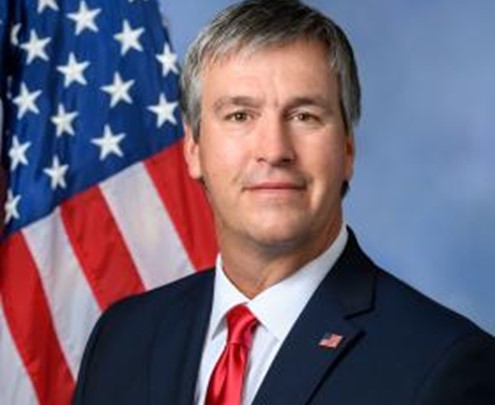
Congressman Barry Moore signed a letter to Minority Leader Kevin McCarthy requesting a reconsideration of a GOP Conference Rule change that would remove members who accept committee assignments or serve on a committee without a recommendation from the Republican Steering Committee or the Republican Leader. The letter, written by Arizona Rep. Andy Biggs, comes in response to the select committee investigating the January 6th attack on the Capitol. McCarthy was given five picks to serve on the committee. However Nancy Pelosi rejected two, and McCarthy pulled his other three as well. Pelosi, in an effort to maintain a bipartisan committee, asked Liz Cheney and Adam Kinzinger to serve on the committee, and they accepted. Congressman Moore stated, “It is absurd that a formal rule prohibiting this behavior is necessary, but Republicans must be united to defeat Nancy Pelosi’s socialist takeover of America, and the Republican conference should swiftly make this rule change to expel anyone who has chosen to take marching orders from her.” “Accepting committee assignments from Speaker Pelosi and ignoring the long-standing practice and rule of being nominated by designated GOP members is a betrayal to our party’s efforts against Pelosi and the Far Left’s attacks,” stated Biggs. “As Republican Members of Congress, it is our duty to strategize effective measures that protect America’s foundational values. We cannot allow our party, which stands as a bulwark against the socialist agenda of the Democrats, to be infiltrated by individuals who are coordinating with members of the opposition. Our party’s integrity, and the voice of conservative Americans who voted for us, must be protected and upheld.” Removal from the conference requires a two-thirds vote of all its members. Only the party leader can bring such a motion to a vote. Kinzinger’s spokesperson Maura Gillespie said in a statement that the congressman is looking for answers about the January 6 attack. “When a Member makes repeated calls to remove Representatives Kinzinger and Cheney from the Conference, it certainly calls into question their true motives,” Gillespie said. “Especially when that Member pushes conspiracy theories to their constituents and outright lies for their own personal gain.” The letter to McCarthy states, “Congresswoman Cheney and Congressman Kinzinger are two spies for the Democrats that we currently invite to the meetings, despite our inability to trust them.” On Twitter, Kinzinger responded, “I think this is interesting. Just coming off a member declaring bloodshed will happen, many pushing Covid denialism and Jan 6 trutherism….The GOP has a choice. I am even more committed to getting the truth now.” In July, Cheney posted on Twitter, “We cannot leave the violence of January 6th – and its causes – uninvestigated. We must know what happened at the Capitol and the White House on the day.” Matt Gaetz, one of the 16 cosigners commented, “Instead of investigating the Jihad Squad’s connections to groups that foment political violence like BLM and Antifa, Liz Cheney and Adam Kinzinger have taken on Pelosi appointments to target the Republican Firebrands in Congress. Kevin McCarthy should remove them from their committees immediately.” Rep. Marjorie Taylor Greene stated, “Liz Cheney and Adam Kinzinger knew all along the Jan. 6 committee was Witch Hunt 2.0, just like the one Democrats launched against President Trump. They’ve sold out Republicans and they must be thrown out of the GOP conference!” Additional cosigners of the letter are Reps. Jody Hice, Matt Gaetz, Andrew Clyde, Marjorie Taylor Greene, Lauren Boebert, Dan Bishop, Randy Weber, Ralph Norman, Andy Harris, Scott Perry, Bill Posey, Madison Cawthorn, Mary Miller, Louie Gohmert, and Bob Good.
Conservatives decry door-to-door vaccine checks

Two Alabama leaders, Mo Brooks and Barry Moore, and dozens of other members of Congress sent a joint letter to President Joe Biden last week regarding his decision to implement door-to-door checks on the American people to coerce them into receiving the COVID-19 vaccine: The letter states, “Your administration’s decision to go door-to-door to coerce individuals to receive a COVID-19 vaccine is deeply disturbing and violates the privacy of Americans. The private health information of millions of Americans should never be a matter of concern for the federal government. Americans must be free to make their own personal health choices.” The concern, coming mostly from Republicans, comes from a statement from President Biden on July 6, when he stated, “Now we need to go to community by community, neighborhood by neighborhood, and oftentimes, door to door – literally knocking on doors – to get help to the remaining people protected from the virus.” During the White House briefing, the president also called on providing vaccines to all healthcare providers, including pediatricians, and discussed providing mobile clinics that could be set up at events like sports events and festivals. Even though Alabama has one of the lowest rates of COVID-19 vaccinations in the country, there are no plans to start a door-to-door campaign. According to NBC15, Dr. Karen Landers commented that it was a strategy that was discussed but that the state is not adopting it. Dr. Landers stated, “No, we are not doing that in this point in time as far as going door to door.” “Persons just really not necessarily being receptive to persons coming on to their property or coming to their door with information,” she said. Jim Zeigler recently called on Governor Kay Ivey to ban what he called “door-to-door vaccine squads” in Alabama. Zeigler asked Ivey to “use the strongest steps to clearly direct federal agents and their recruits that their entry onto home properties in Alabama could legally be considered trespassing.” Arizona Rep. Andy Biggs said in a statement, “Door-to-door vaccine checks on Americans are a blatant abuse of government authority and a pure power play by the Biden administration. The federal government has no right to track the private health information of Americans or to intimidate people into getting the vaccine. Instead of meddling in private medical decisions, the Biden administration should focus on addressing the border crisis, the rampant rise in inflation, and the crime wave that is plaguing American cities – all crises it created. The door-to-door spying on Americans is one more example of the burgeoning surveillance state by the national government.” Biggs posted on Twitter, “I just sent a letter to Biden demanding answers on his door-to-door vaccine checks. The fed gov has no right to track the private health information of Americans or to intimidate people into getting the vaccine.” Other leaders that signed the letter include David Schweikert, Paul Gosar, Ralph Norman, Bob Good, Warren Davidson, Marjorie Taylor Greene, Thomas Tiffany, Jody Hice, Lauren Boebert, Alex Mooney, Chip Roy, Andy Harris, Scott DesJarlais, Andrew Clyde, Yvette Herrell, H. Morgan Griffith, Bill Posey, Randy Weber, Michael Cloud, Dan Bishop, Ben Cline, Mary Miller, Louie Gohmert, Debbie Lesko, Mike Garcia, and Matt Gaetz.
Barry Moore supports Lauren Boebert’s call to censure Joe Biden over border crisis
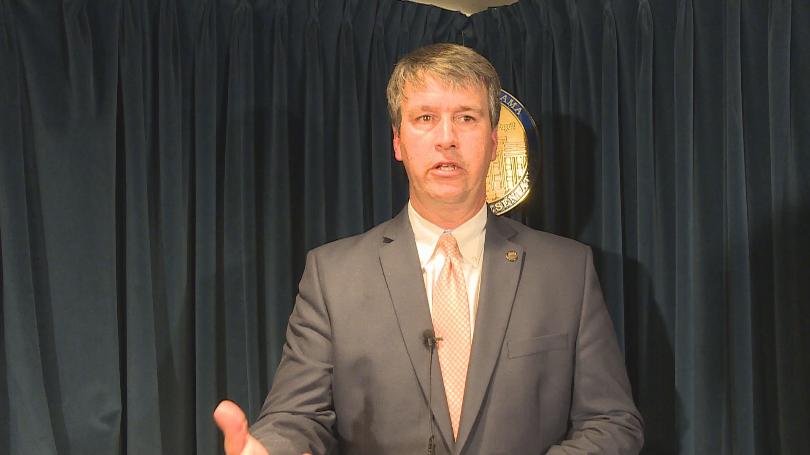
Rep. Barry Moore has joined other leaders to support Rep. Lauren Boebert’s bill to censure President Joe Biden over the border crisis. According to a press release, Moore joined Boebert and other leaders in a press conference to address the resolution. Moore has visited the southern border twice this year. President Biden has not visited the border yet. Some statistics Moore emphasized in his release include: Under President Trump, there were 1,400 children in HHS custody at the border. At one point in June, there were 22,000. Over 1 million illegal aliens have been encountered by CBP since Biden took office, including a record-breaking 180,000 illegal aliens in May. Since Biden took office, CBP arrested 1,413 alien drug smugglers—up from 386 last year. Since Biden took office, CBP arrested 40 alien murderers—up from 3 last year. Since Biden took office, CBP arrested 353 alien sex offenders—up from 156 last year. Since Biden took office, CBP arrested 1,118 aliens for DUIs—up from 364 last year. In just the first four months of Biden’s term, enough fentanyl to kill every American four times over has been interdicted by Border Patrol. Moore stated, “Ensuring the integrity of our borders is one of the most fundamental duties of a president, yet President Biden has destroyed four years of progress at the border to satisfy far-left activists and cheap labor-loving globalists. His reckless determination to reverse every Trump administration policy regardless of the outcome has put every American family and our economy at risk. We must hold President Biden to account for putting politics over the people he has sworn an oath to protect.” Moore stated on Twitter, “President Biden’s dereliction of duty at our southern border is completely unacceptable. Proud to join @RepBoebert in holding Biden accountable for putting politics over the people he has sworn an oath to protect.” President Biden's dereliction of duty at our southern border is completely unacceptable. Proud to join @RepBoebert in holding Biden accountable for putting politics over the people he has sworn an oath to protect. https://t.co/hXhV1H98uQ — Rep. Barry Moore (@RepBarryMoore) June 24, 2021 The bill is supported by: American Principles Project, Citizens for Renewing America, Eagle Forum, Federation for American Immigration Reform (FAIR), Heritage Action, and NumbersUSA. Along with Moore, 22 additional Members of Congress joined Boebert to introduce her bill including: Reps. Andy Biggs, Dan Bishop, Madison Cawthorn, Jeff Duncan, Pat Fallon, Matt Gaetz, Louie Gohmert, Bob Good, Paul Gosar, Morgan Griffith, Diana Harshbarger, Jody Hice, Ronny Jackson, Thomas Massie, Alex Mooney, Troy Nehls, Ralph Norman, Marjorie Taylor Greene, Bill Posey, Lance Gooden, Chip Roy, and Randy Weber.
Congressmen call for the reopening of the U.S. Capitol
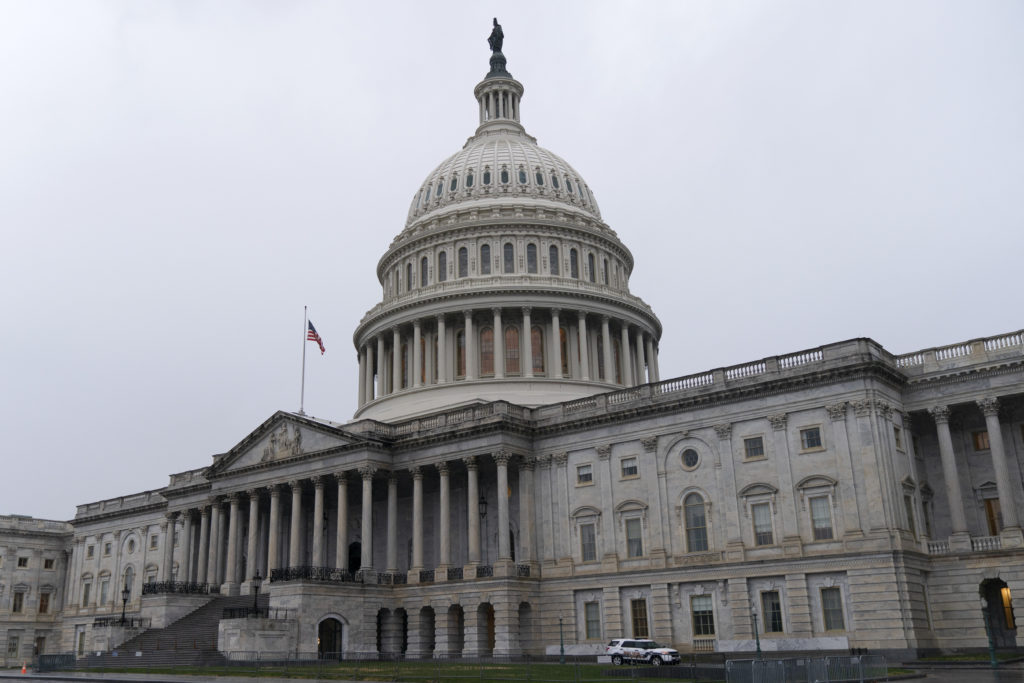
Today, Congressmen Robert Aderholt, Jerry Carl, Mo Brooks, and Barry Moore joined more than two dozen other leaders, asking Speaker Nancy Pelosi and Senate Majority Leader Chuck Schumer to reopen the United States Capitol Complex to visitors. The Capitol has been closed since the January 6 attack by a mob of pro-Trump protestors. In March 2020, the U.S. Capitol had restricted access because of COVID-19 concerns. As more and more people become vaccinated, the push to reopen has been becoming louder. However, there are still security concerns. Brooks stated, “The First Amendment to the Constitution establishes the people’s right to petition their government for redress of their grievances. Prior to Pelosi and Schumer’s draconian Capitol access restrictions, the American people could easily visit the Capitol offices of their senators and representatives. Now, to gain access to the House and Senate office buildings, citizens must be on preapproved lists kept by the House and Senate Sergeant at Arms.” He continued, “America has historically prided ourselves on transparency and easy citizens access to government institutions. It is shameful that Nancy Pelosi and Chuck Schumer persist in keeping the law-abiding American citizens out of their own Capitol, especially when states are lifting restrictions and the CDC is recommending fully-vaccinated Americans return to pre-COVID normalcy. Nancy Pelosi said ‘about 75%’ of House members are vaccinated. That exceeds herd immunity requirements.” Aderholt commented, “With the pandemic coming to an end, it is time to open the United States Capitol Complex to the citizens it belongs to. While those of us elected to Congress, and members of our staff all work in the Capitol, we should never come to believe that it is there strictly for our exclusive use. We are there because the people of this country elected us and they should be able to visit their elected leaders and take tours of their Capitol.” Other co-signers of the letter are: Congressman Ralph Norman, Congressman Andy Harris, Congressman Madison Cawthorn, Congressman W. Gregory Steube, Congressman Matt Rosendale, Congressman Brian Mast, Congressman Tracey Mann, Congressman Tom McClintock, Congressman Jody Hice, Congressman Andy Biggs, Congressman Chip Roy, Congressman Tom Tiffany, Congressman Debbie Lesko, Congressman Jeff Duncan, Congressman Warren Davis, Congressman Mike Gallagher, Congressman Bill Posey, Congressman Bob Good, Congressman Randy Weber, Congressman Dan Bishop, Congressman Paul Gosar, Congressman Ronny L. Jackson, Congressman Joe Wilson, Congressman Louie Gohmert, Congressman Brian Babin, Congressman Neal Dunn, Congressman Marjorie T. Greene, Congressman Michael Cloud. The letter can be viewed here.
GOP firebrand Mo Brooks enters Senate race

U.S. Rep. Mo Brooks, a conservative firebrand and staunch supporter of former President Donald Trump who has come under fire for remarks he made preceding the attack on the U.S. Capitol, joined the Alabama GOP primary field on Monday to replace Sen. Richard Shelby. The north Alabama Republican announced his entry into the race at an event with former Trump adviser Stephen Miller. He joins former Trump ambassador Lynda Blanchard in a Republican primary field that is expected to attract a number of other hopefuls. “America’s status as the greatest nation in world history is at risk. And it’s at risk from those within our country,” Brooks told people packed into a meeting hall of a gun range in the northern city of Huntsville. Later, he added, “We are a beacon of freedom and liberty for the world, and we need to stay that way.” Miller was an influential force in pushing Trump’s efforts to curb immigration. He engineered the former president’s Muslim travel ban and was widely viewed as the driving force behind the Trump administration’s hardest-line immigration policies. “Nobody has had President Trump’s back more over the last four years than Mo Brooks. Now I need you to have his back,” Miller said as he introduced Brooks. Brooks, 66, has come under fire for telling the rally that preceded the Capitol riot that it was time to “start taking down names and kicking ass.” Brooks said the phrase was intended to fire up the crowd for the next election cycle and is being misconstrued as advocating the violence that followed. Shelby announced earlier this year that he would not seek reelection in 2022, igniting what is expected to be a messy GOP primary at a time when the national Republican Party is trying to chart a direction following Trump’s departure. Brooks has served five terms in the House, where the former prosecutor joined the conservative Freedom Caucus. He serves on the Armed Services Committee and Science, Space, and Technology, two important committees for his north Alabama district. “America cannot afford senators who cower in their foxholes,” Brooks said. He added, “As President Trump can vouch, I don’t cut and run. I stand strong when the going gets tough.” Republican hopefuls in a state where Trump won 62% of the vote are expected to try to convince primary voters they are the rightful banner carriers for the Trump agenda. But some observers worry the race could crown a far-right nominee to replace one of the Senate’s most senior leaders with a deep establishment ties. Republican former Rep. Bradley Byrne of Alabama said the winner of the GOP primary will likely be whoever can convince voters they are the best heir to Trump and his “Make America Great Again” agenda. “They are going to be very conservative. They are going to be the most genuine, most effective carrier of the Trump/MAGA flame,” Byrne said. David Mowery, an Alabama-based political consultant, said support for Trump is “the table stakes” — a requirement to get in the game for Republicans seeking office in Alabama. However, Mowery said he thinks there is trepidation among establishment Republicans. While Shelby amassed a far-right conservative voting record, he never embraced the bombastic, populist style that has propelled Republicans like Georgia Rep. Marjorie Taylor Greene. “I think people are worried that you are going to get someone that’s more concerned about throwing bombs and seeing their name in the paper then you are somebody who does what Shelby does and that is bring home the bacon and make sure Alabama is taken care of in every spending bill,” Mowery said. Others sometimes mentioned as potential candidates are Alabama Secretary of State John Merrill and Shelby’s former chief of staff, Katie Boyd Britt, who now heads an influential business lobby. Republished with the permission of the Associated Press.
Gary Palmer will vote against H.R. 1 election bill
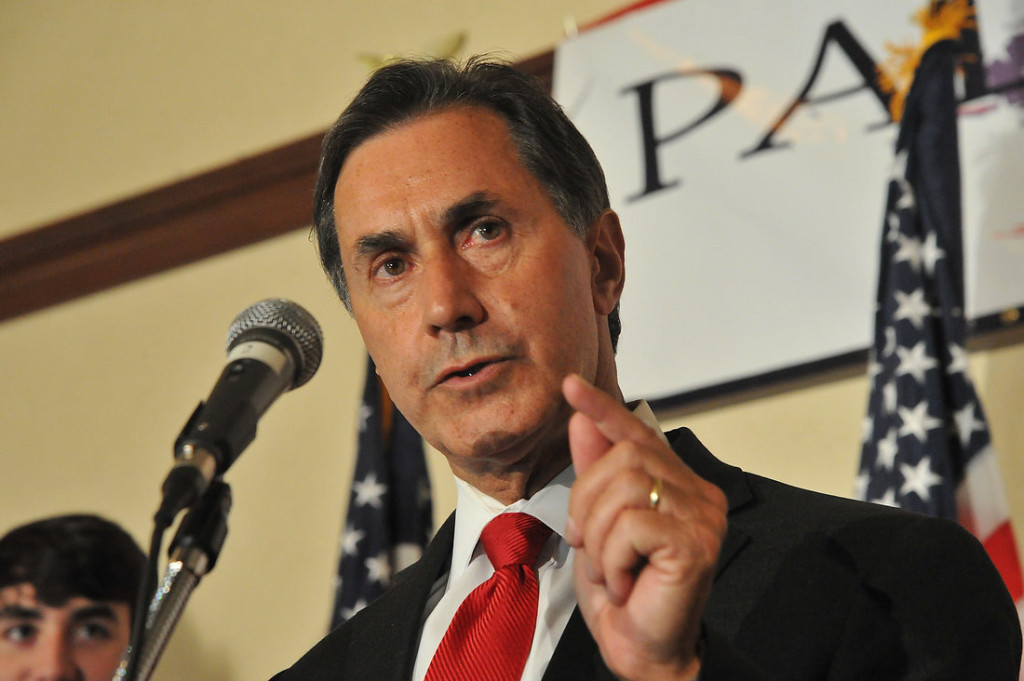
Congressman Gary Palmer announced he will vote against H.R. 1, For the People Act of 2021. According to the Congress.gov summary, the bill addresses “voter access, election integrity and security, campaign finance, and ethics for the three branches of government.” The bill aims to expand voter registration, voting access, and limits removing voters from voter rolls. It also addresses election security, campaign finance and requires the President, the Vice President, and candidates for those offices to disclose 10 years of tax returns. Palmer stated in a press release that the bill undermines Americans’ right to self-government and public confidence in the country’s election system. He stated, “This bill puts the hypocrisy of the Democrat majority on full display in two ways. First, there is nothing in the bill to deal with the inaccurate voter registration rolls that have been reported to hold 24 million improper voter registrations. The 1993 National Voter Registration Act, which was passed by Democrat majorities in both houses of Congress, requires that every state and county maintain accurate voter registration files. There are currently 17 Democrat members of Congress who voted for that bill, including Speaker Nancy Pelosi and Majority Leader Steny Hoyer. They have done nothing to enforce the law they passed.” Palmer continued, “In addition to allowing millions of improper voter registrations, the Democrats are also putting in place a provision to give millions of dollars to the reelection campaigns of incumbent members of Congress at a match rate of $6 for every dollar raised, for a match of up to $7.2 million per incumbent member. Consider this – just a few weeks ago, the Democrats stripped my colleague, Representative Marjorie Taylor Greene, of her committee assignments. But now, they seem to believe that though she isn’t allowed to serve on any standing committees, she should receive taxpayer-financed campaign contributions. Based on the formula in the bill and what Representative Greene has raised already, she would receive over $7 million. In an act of rank hypocrisy, every Democrat who voted to strip Representative Greene of her committee assignments turned around and co-sponsored this bill to give her reelection campaign over $7 million dollars.” “No one who truly wants honest and fair elections can vote for H.R. 1,” Palmer concluded. “It takes the power of electing our leaders away from the people and puts more power into the hands of politicians. It disregards state voter I.D. laws and ultimately amounts to a federal takeover of our elections. Perhaps most concerning is that it would force taxpayers to foot the bill for political campaigns, creating a ruling class that undermines representative government. It will be government of, by, and for the politicians who run the government, but not for the people the government is supposed to serve.” Palmer posted on Twitter, “No one who truly wants honest and fair elections would vote for #HR1. It takes the power of electing our leaders away from the people and puts more power into the hands of politicians.” No one who truly wants honest and fair elections would vote for #HR1. It takes the power of electing our leaders away from the people and puts more power into the hands of politicians. My full statement here: https://t.co/CXyw4wTCYZ — Gary Palmer (@USRepGaryPalmer) March 3, 2021 Congressman Mo Brooks also opposes the bill. He stated on Twitter, “Voting against #HR1 because it undermines America’s Republic and effectively turns our election results into what we so often see in North Korea, the old Soviet Union, Venezuela and other pretend republics. Sure, you can vote. But your votes don’t count.” Voting against #HR1 because it undermines America’s Republic & effectively turns our election results into what we so often see in North Korea, the old Soviet Union, Venezuela & other pretend republics. Sure, you can vote. But your votes don’t count. https://t.co/vfOSjx5Nuy — Mo Brooks (@RepMoBrooks) March 2, 2021
Conservative gathering to feature Donald Trump’s false fraud claims

A gathering of conservatives this weekend in Florida will serve as an unabashed endorsement of former President Donald Trump’s desire to remain the leader of the Republican Party — and as a forum to fan his false claim that he lost the November election only because of widespread voter fraud. Matt Schlapp, chairman of the Conservative Political Action Conference and a Trump ally, said discussion panels on election integrity would highlight “huge” evidence of illegal voting in Georgia, Nevada, and elsewhere that ultimately swung the election for Democrat Joe Biden. Such baseless claims fueled the Jan. 6 attack on the U.S. Capitol and have been repeatedly dismissed by the courts, the Trump administration’s leading security officials, and senior Republicans in Congress, including Senate Minority Leader Mitch McConnell of Kentucky. The conference marks the first significant gathering of Republicans since the election and its aftermath as the party reckons with the faction that continues to support Trump as its leader and those who think the GOP needs to move quickly beyond the turbulent era of his presidency. Conference organizers, representing the first camp, did not invite any of the 17 Republican members of Congress who voted to support Trump’s second impeachment or any major Trump critics. McConnell, a regular at the annual conference, will not be on the program after publicly chastising Trump for inciting last month’s deadly insurrection at the Capitol. McConnell and his allies are worried that Trump will undermine the party’s political future should the former president and his conspiracy theories continue to dominate Republican politics. But at the conference, which will feature Trump along with most of the GOP’s leading 2024 presidential prospects, organizers say election fraud will be a major theme. “Because we pretty much wiped away scrutiny in a lot of these important swing states, you had a lot more illegal voting. That is not an opinion, that is fact,” Schlapp told The Associated Press before the conference’s kickoff Thursday evening. But in five dozen court cases around the country after the election, no such evidence was presented, and Trump’s then-attorney general, William Barr, said the Justice Department also had found none. At the conference, though, those fact-based assessments are likely to be few, if any. Trump himself is headlining the three-day session in a Sunday speech that will be his first public appearance since leaving the White House on Jan. 20. The event is being held in central Florida, having been blocked from meeting at its usual Maryland hotel by coronavirus restrictions in that state. Trump has been keeping a relatively low profile since he moved from the White House to Palm Beach a month ago. He is expected to use his speech to assert his standing as the head of the party, as well as to harshly criticize Biden’s first month in office, including the new president’s efforts to undo Trump’s immigration policies. “I think the broader point will be: Here’s where the Republican Party and conservative movement and the America First movement goes from here,” said senior Trump adviser Jason Miller. “In many ways, this will be a throwback to 2016, where the president ran against Washington. Here we’ll see the president address the fact that the only divide in the Republican Party is between the elites and the conservative grassroots in the party.” Trump has begun to wade back into the public, calling into friendly news outlets after the death of conservative commentator Rush Limbaugh and after golfer Tiger Woods’ serious car accident. His aides have been meeting this week to set benchmarks for fundraising and organization for candidates seeking his endorsement as he tries to plot a future that will include backing those who will challenge lawmakers who voted for his impeachment and whom he deems insufficiently loyal. “They need to show that they’re going to be serious candidates before asking the president to get out there for them,” Miller said. Arkansas Sen. Tom Cotton, among several scheduled speakers who are contemplating a 2024 presidential run, declined to describe Trump as the outright leader of the GOP. “In opposition, when you don’t have the White House, there are many more voices that lead the party,” Cotton said in an interview. The event will feature a seven-part series on “Protecting Elections,” including one titled “Why Judges & Media Refused to Look at the Evidence,” featuring Rep. Mo Brooks, R-Ala. The conservative congressman addressed the rally near the White House just before the Jan. 6 Capitol attack, telling the crowd, “Today is the day American patriots start taking down names and kicking ass.” Others who attended “Stop the Steal” rallies and participated in efforts to overturn the results will also be featured alongside panelists bemoaning China’s power, “Cancel Culture,” and “California Socialism.” Trump has a long history with CPAC, which played a key role in his emergence as a force in conservative politics. He attended the conference every year he served as president. While he is mulling running again four years from now, the event will feature speakers thought to be considering their own runs in 2024, including former Secretary of State Mike Pompeo, Sens. Ted Cruz of Texas and Josh Hawley of Missouri, and Gov. Ron DeSantis of Florida and Kristi Noem of South Dakota. In the interview, Cotton refused to say there was widespread election fraud in the 2020 election. In an implicit nod to those who do, he encouraged efforts by Republican officials in various states to strengthen election security. Voting rights groups fear that such efforts will make it more difficult for many people, especially nonwhite voters, to cast ballots. “I don’t want election procedures that were adopted in the middle of a pandemic to become the normal practice,” Cotton told the AP. “Especially when those procedures are — just as a factual matter — more susceptible to potential fraud.” Among those who will not be in attendance this weekend: Former Vice President Mike Pence, who has maintained a low profile since leaving the White House and
Dem-led House, drawing a line, kicks Marjorie Taylor Greene off committees

A fiercely divided House tossed Rep. Marjorie Taylor Greene off both her committees Thursday, an unprecedented punishment that Democrats said she’d earned by spreading hateful and violent conspiracy theories. Underscoring the political vise her inflammatory commentary has clamped her party into, nearly all Republicans voted against the Democratic move but none defended her lengthy history of outrageous social media posts. Yet in a riveting moment, the freshman Republican from a deep-red corner of Georgia took to the House floor on her own behalf. She offered a mixture of backpedaling and finger-pointing as she wore a dark mask emblazoned with the words “FREE SPEECH.” The chamber’s near party-line 230-199 vote was the latest instance of conspiracy theories becoming pitched political battlefields, an increasingly familiar occurrence during Donald Trump’s presidency. He faces Senate trial next week for his House impeachment for inciting insurrection after a mob he fueled with his false narrative of a stolen election attacked the Capitol. Thursday’s fight also underscored the uproar and political complexities that Greene — a master of provoking Democrats, promoting herself, and raising campaign money — has prompted since becoming a House candidate last year. Eleven Republicans joined 219 Democrats in backing Greene’s ejection from her committees, while 199 GOP lawmakers voted “no.” Addressing her colleagues, Greene tried to dissociate herself from her “words of the past.” Contradicting past social media posts, she said she believes the 9-11 attacks and mass school shootings were real and no longer believes QAnon conspiracy theories, which include lies about Democratic-run pedophile rings. But she didn’t explicitly apologize for supportive online remarks she’s made on other subjects, as when she mulled about House Speaker Nancy Pelosi being assassinated or the possibility of Jewish-controlled space rays causing wildfires. And she portrayed herself as the victim of unscrupulous “big media companies.” News organizations “can take teeny, tiny pieces of words that I’ve said, that you have said, any of us, and can portray us as someone that we’re not,” she said. She added that “we’re in a real big problem” if the House punished her but tolerated “members that condone riots that have hurt American people” — a clear reference to last summer’s social justice protests that in some instances became violent. Greene was on the Education and Labor committee and the Budget committee. Democrats were especially aghast about her assignment to the education panel, considering the past doubt she cast on school shootings in Florida and Connecticut. The political imperative for Democrats was clear: Greene’s support for violence and fictions were dangerous and merited punishment. Democrats and researchers said there was no apparent precedent for the full House removing a lawmaker from a committee, a step usually taken by their party leaders. The calculation was more complicated for Republicans. Though Trump left the White House two weeks ago, his devoted followers are numerous among the party’s voters, and he and Greene are allies. Minority Leader Kevin McCarthy, R-Calif., hopes GOP victories in the 2022 elections will make him speaker. Republicans could undermine that scenario by alienating Trump’s and Greene’s passionate supporters, and McCarthy took no action to punish her. “If any of our members threatened the safety of other members, we’d be the first ones to take them off a committee,” Pelosi angrily told reporters. She said she was “profoundly concerned” about GOP leaders’ acceptance of an “extreme conspiracy theorist.” At one point, No. 2 Democratic leader Steny Hoyer of Maryland strode to the GOP side of the chamber carrying a poster of a Greene Facebook post from last year. “Squad’s Worst Nightmare,” Greene had written in the post, which showed her holding an AR-15 firearm next to pictures of three of the four Democratic lawmakers, all young women of color, who’ve been nicknamed “The Squad.” “They are people. They are our colleagues,” Hoyer said. He mimicked Greene’s pose holding the weapon and said, “I have never, ever seen that before.” Republicans tread carefully but found rallying points. McCarthy said Greene’s past opinions “do not represent the views of my party.” But without naming the offenders, he said Pelosi hadn’t stripped committee memberships from Democrats who became embroiled in controversy. Among those he implicated was Rep. Ilhan Omar, D-Minn., who made anti-Israel insults for which she later apologized. “If that’s the new standard,” he said of Democrats’ move against Greene, “we have a long list.” Rep. Tom Cole, R-Okla., said Democrats were setting a precedent by punishing lawmakers for statements made before they were even candidates for Congress. Rep. Jim Jordan, R-Ohio, warned, “You engage in wrong-speak, you’re in the Thunder Dome,” a term for an enclosed wrestling arena. Committee assignments are crucial for lawmakers for shaping legislation affecting their districts, creating a national reputation, and raising campaign contributions. Even social media stars like Greene could find it harder to define themselves without the spotlights that committees provide. Not all Republicans were in forgiving moods, especially in the Senate. There, fringe GOP candidates have lost winnable races in recent years and leaders worry a continued linkage with Trump and conspiracists will inflict more damage. That chamber’s minority leader, Mitch McConnell, R-Ky., this week called Greene’s words a “cancer” on the GOP and country. On Thursday, No. 2 Senate GOP leader John Thune of South Dakota amplified that thinking. Thune said House Republicans needed to issue a “really strong” rebuke of Greene’s conspiratorial formulations. Republicans must “get away from members dabbling in conspiracy theories,” Thune said. “I don’t think that’s a productive course of action or one that’s going to lead to much prosperity politically in the future.” The fight came a day after Republicans resolved another battle and voted to keep Rep. Liz Cheney, R-Wyo., in their leadership. Pro-Trump conservatives tried removing her because she supported Trump’s impeachment. The House resolution punishing Greene was barely over a page. It said House rules require lawmakers’ behavior to “reflect credibly” on the chamber and said Greene should be removed “in light of conduct she has exhibited.” News organizations have unearthed


